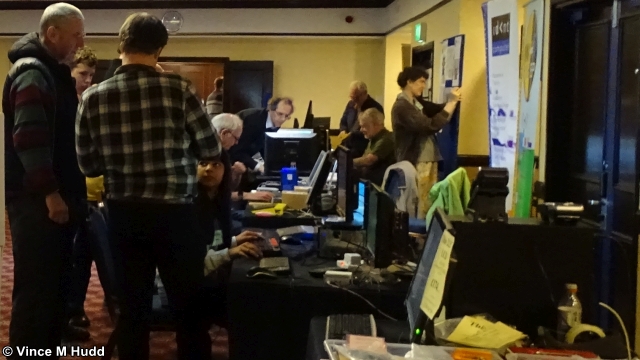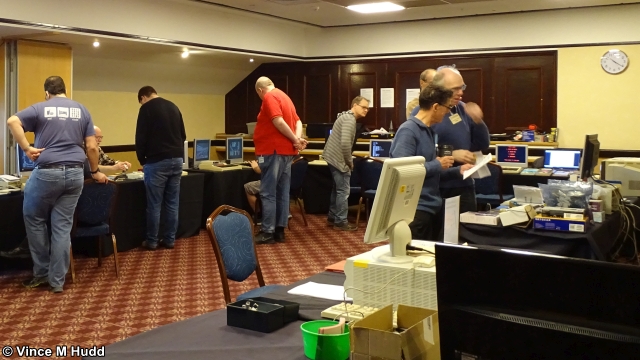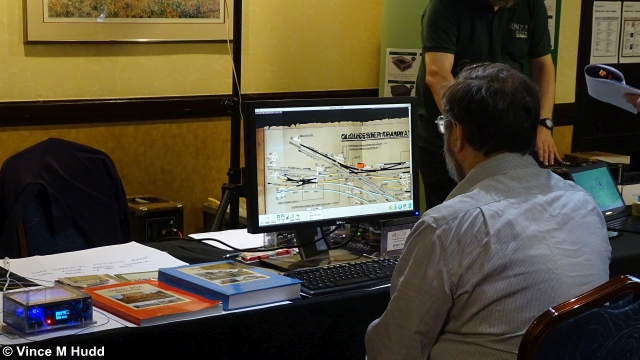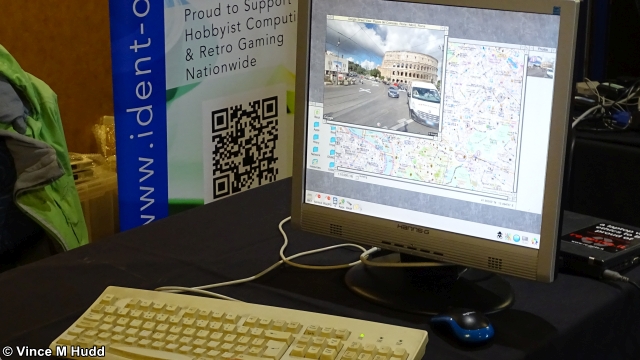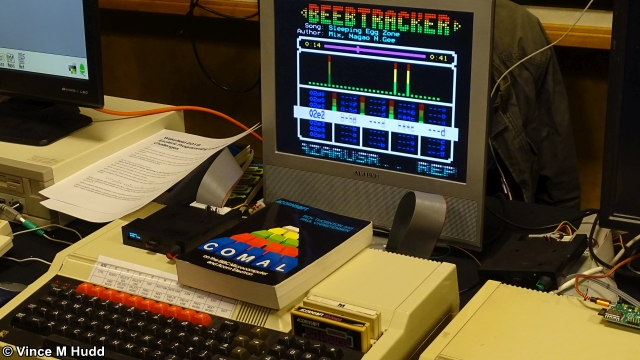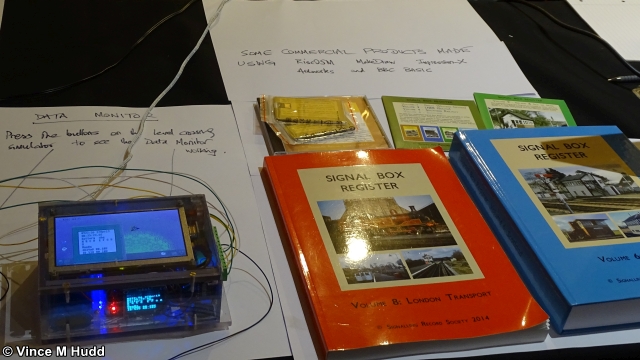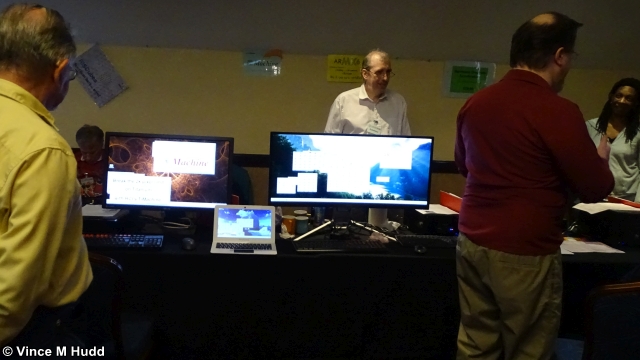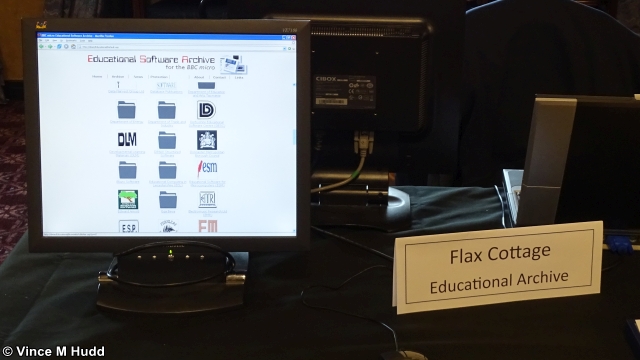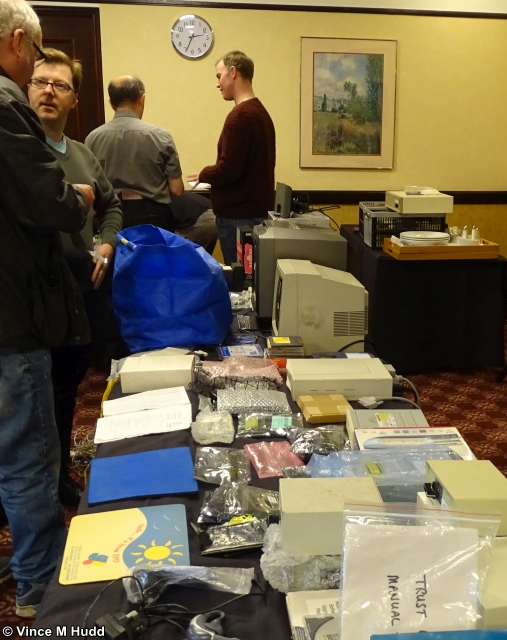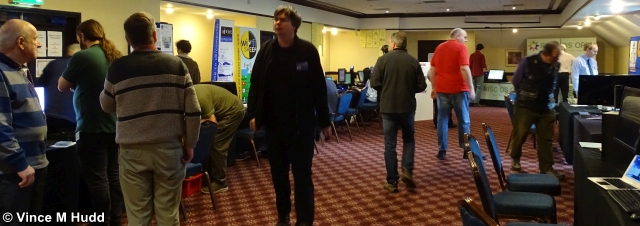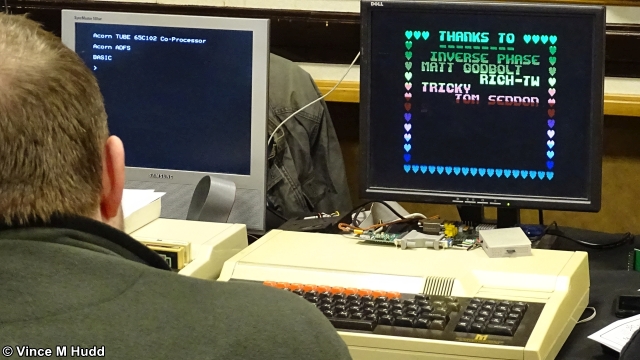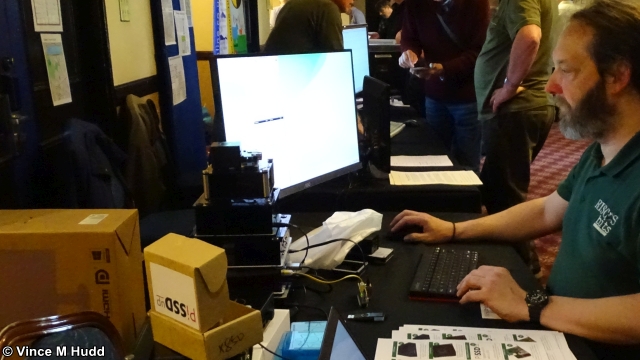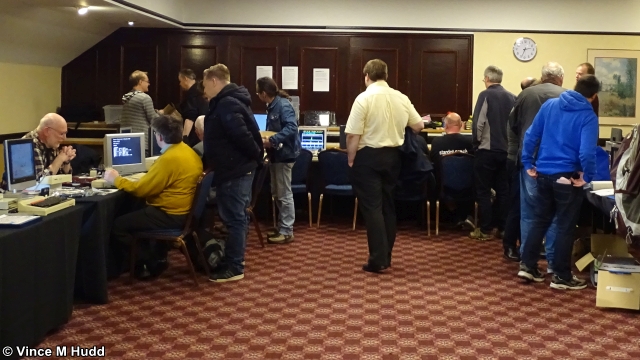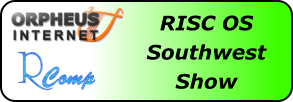Six months on from the show itself… that’s almost as long as the Long Gap between the Wakefield and London shows! Ahem.
The place to be for discerning RISC OS users (and retro Acorn enthusiasts) on Saturday, 27th April, was Wakefield – more specifically, the Cedar Court Hotel in Calder Grove – because that was where the annual Wakefield Acorn and RISC OS Computer Show took place.

This was the 24th such show, and the event once again proved its worth as one of the highlights of the platform’s year, although I note the organisers’ regular claim that it’s “the North’s Premier RISC OS Show” and find myself wondering about the competition it faces for that accolade. 😉
A new regular feature of these show reports is me apologising for how late it is to appear. So… I apologise for the late appearance of this show report. I’ll try to do better in future. 😉
As usual, the show took place in the Cypress, Hawthorne, and Oak Suites of the hotel, with the Cypress Suite being occupied by RISC OS exhibitors, earning it the designation of the RISC OS room, and the other two (as a single room) being occupied mostly by retro exhibitors (as well as the charity stand and user groups), which I’ll continue to call the Retro room. This report will follow an anti-clockwise path around the Retro room, followed by a clockwise path around the RISC OS room – an overall figure of 8.
Wakefield RISC OS Computer Club
Once a visitor had paid their entrance fee at the table just outside the main door, the first stand they would encounter belonged to the Wakefield RISC OS Computer Club (WROCC) – the local group and show’s organisers.
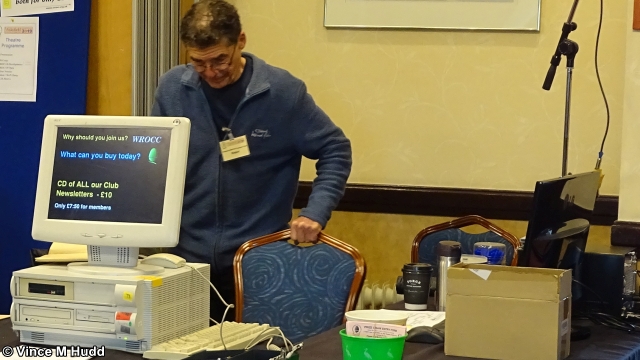
The group holds meetings monthly, and attendees often benefit from an interesting presentation, whether that be from a guest speaker or a local member, and it also publishes a newsletter – the WROCC – which is delivered by email as a PDF file. As well as memberships, which cost £15.00 annually, discounted to £7.50 for the first year, they were selling the ninth edition of their back catalogue CD featuring those newsletters (a full thirty six volumes), thus allowing non-members to get a feel for what they’re missing and conclude it might be worth joining after all.
The WROCC stand was also the place to buy tickets for entry into the prize draw, which has become a regular feature of the show. The first prize was PiRO Core with a Raspberry Pi 3B+, 32GB OS Card in a commemorative Wakefield 2019 case, provided by RISCOSbits, and was won by Rebecca Fawthrop. The second prize was a choice of Sine Nomine software in download form – RiscOSM, Impact, or Recce and Sine Nomine’s games – was won by Paul Humphreys. The third prize, a custom Wakefield Show 2019 case for the Raspberry Pi (not included) was won by Graham Thurwell and, last but not least, a RISCOSbits custom-engraved keyring was given to a fourth prize winner, Vic Mackinlay.
Charity stand
After the organiser’s stand (as opposed to the Organizer stand, which is later!), show visitors had the opportunity to support a good cause via the Charity stand, be that by putting some money into the pot by purchasing an old piece of software, a publication, or a piece of hardware, or by donating an old piece of software, a publication, or a piece of hardware for someone else to buy – or indeed by just donating some cash to the cause.
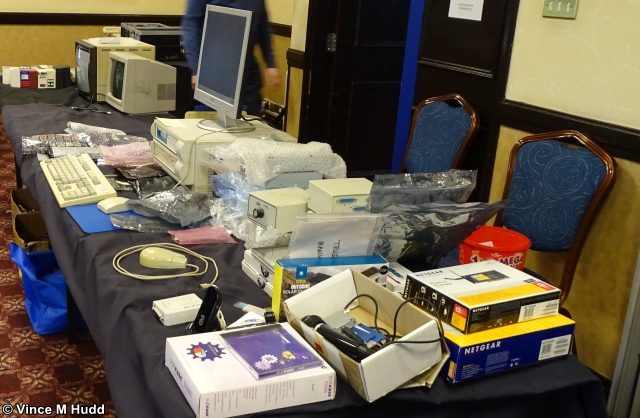
The Wakefield RISC OS Computer Club supports the Wakefield Hospice, so this is where money from the charity stand ends up, and over the years the Wakefield Show has raised over £20,000 for the hospice – and this year the grand total increased by another £734.
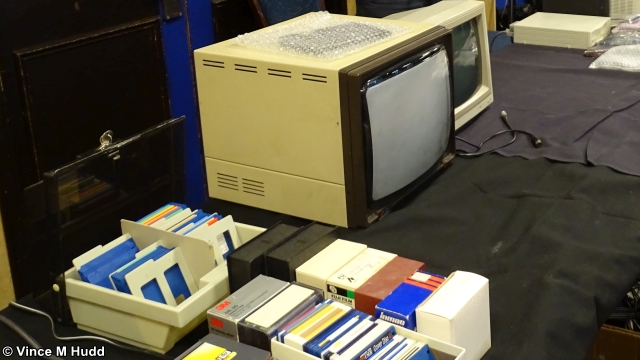
ABUG (Simon Hooper)
The first of two stands billed as representing the Acorn and BBC User Group (ABUG), Simon Hooper was hosting the Stardot High Score Challenge, with a number of games running for people to play and, hopefully, see their name in lights pixels at the top of the high score table.
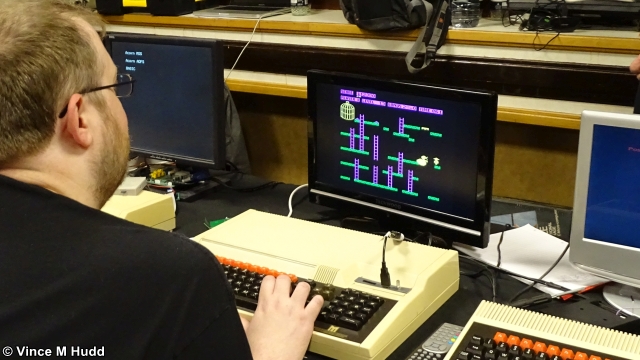
Simon was also able to provide information about the group’s meetings, which aren’t in a fixed location because the membership isn’t focused on a particular area. Meetings are organised via the Stardot forums (the group doesn’t have its own website), and members come from far and wide, with the aim of showing off and discussing their latest projects, and helping one another out by collaborating on programming, providing hardware fixes and solutions, and so on.
A selection of BBC Micro books were also on display on Simon’s stand – I think copies of most of them could be found on my own bookshelf back in the day, and I suspect the same is probably true of a lot of visitors to the show.
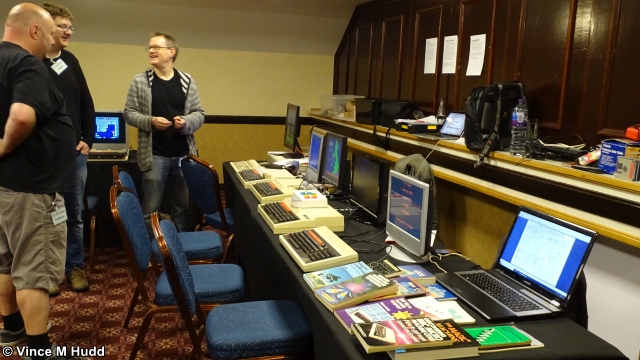
ABUG (Daniel Jameson)
The second ABUG stand belonged to Daniel Jameson, who had brought along an A5000, running an old educational package simulating diving to the Mary Rose to find and retrieve artefacts.

Rob Coleman
VideoNuLa should have been the headline act on Rob Coleman’s stand – that being a very impressive hardware addition for the BBC Micro which provides greatly enhanced graphics capabilities to the 8-bit computer, including a 4,096-colour palette and much smoother scrolling than the original hardware allowed.
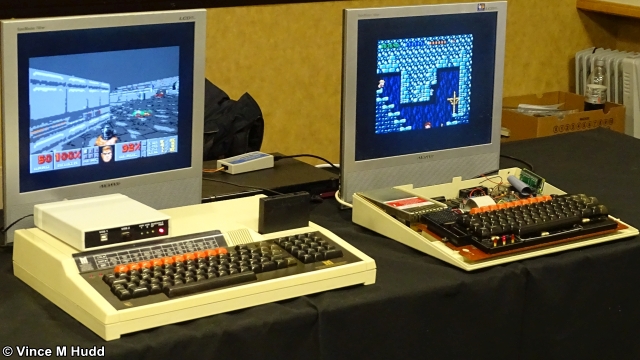
However, Rob was also running the latest version of his work-in-progress; a port of Doom for the Beeb (assisted by a Pi) – and I suspect many of the visitors to his stand were probably drawn more by that than the clever hardware.
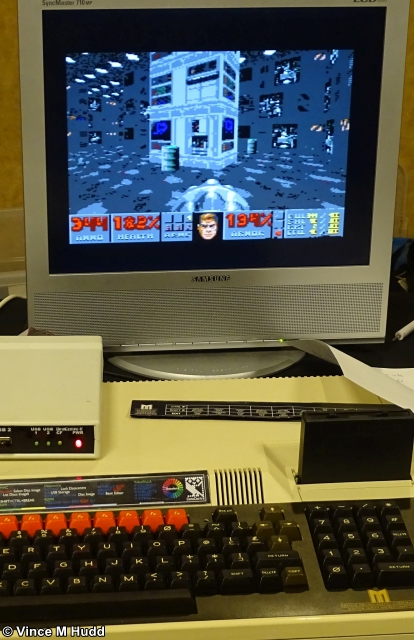
He also had a number of emulators ready to run on the BBC to allow it to run software for such machines as the Amstrad CPC, ZX Spectrum – and even the Jupiter Ace!
Baildon Electronics (Retro Hardware)
With such a healthy retro scene and the 8-bit computers still in wide use, running not only old software, but also newer titles, it’s not entirely surprising that add-on hardware is also still catered for – and that’s what Baildon Electronics, aka Retro Hardware, is all about.
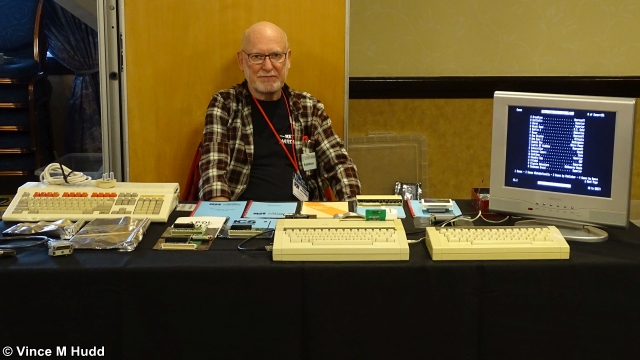
The stand was a source for all manner of upgrades and add-ons for Acorn’s 8-bit computers, including ROM expansion cards for Plus 1-equipped Acorn Electrons, battery-backed RAM add-ons for the Electron and Master, and much more. Retro doesn’t necessarily mean 8-bit, however, and there were some goodies available for the Archimedes (which having been released in 1987 isn’t that much younger than the BBC Micro and other Acorn 8-bit machines) in the form of IDE interfaces.
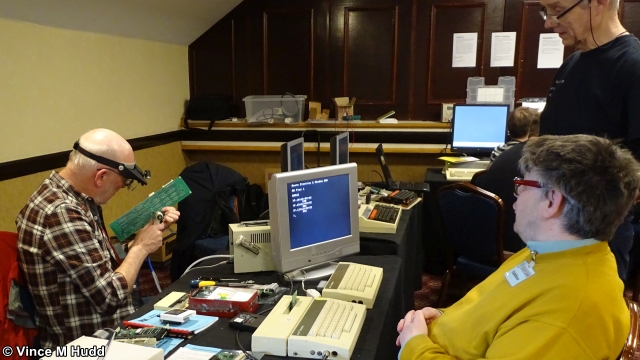
Flax Cottage Educational Archive
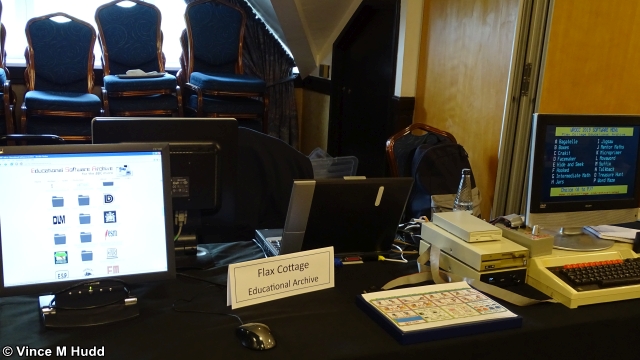
John Dale had once again brought along a BBC Micro that was connected over Econect to a file server to access some of the newer additions to his archive of educational software, along with an internet-connected Raspberry Pi to browse the full Flax Cottage Educational Archive online. John was also showing off some of the tools he uses to check items and add them to the archive – both hardware and software.
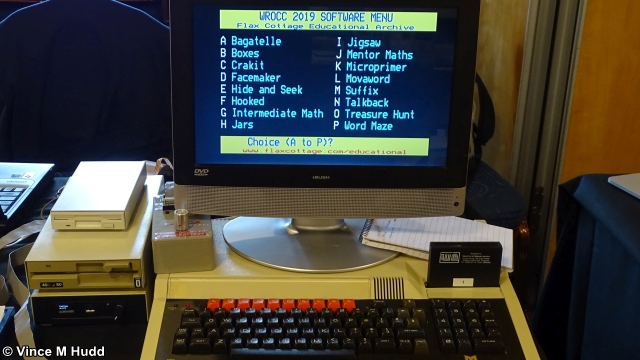
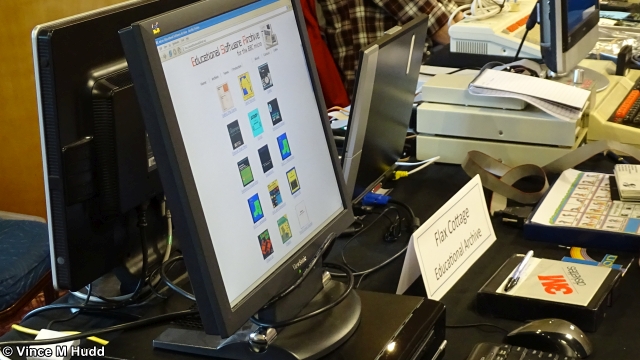
Midland User Group (MUG)
Visitors to the show come from far and wide, so it’s a fair bet that not all visitors find the local group’s meetings practical to attend – but another group that’s continuing to hold regular meetings, often with guest speakers, is the Midlands User Group (MUG).
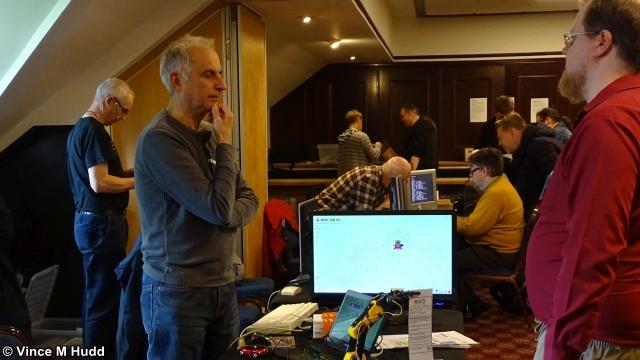
As well as trying to encourage people to think about joining the group and attending those meetings, they were also allowing show visitors to try their hand at controlling a robotic arm, or writing programs in Python and Scratch.
Archive Magazine
The next stand was due to be the home for the day of lesser spotted Archive Magazine but, unfortunately, editor Jim Nagel was suffering from a bout of the dreaded lurgy as the time approached to set off from Glastonbury on the pilgrimage to the Northern gathering point.
Chris Hall
Moving into the RISC OS room and crossing over to the other side, the next exhibitor was Chris Hall, who was selling his family tree software that came about as a result of some lateral thinking: it makes use of an existing tree structured database built into every RISC OS computer – the filing system.
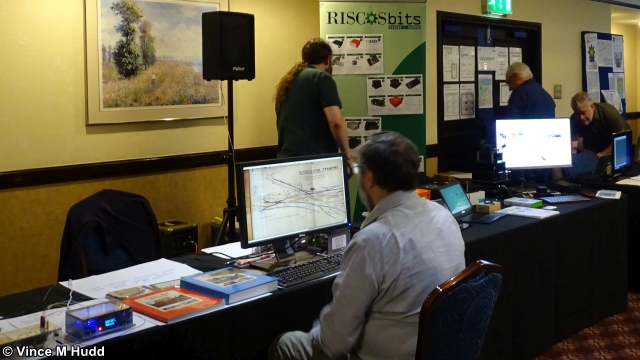
Chris was also showing off his data monitor, which is based around a Raspberry Pi and was originally designed to connect to and monitor level crossing controls on the Severn Valley Railway, and his GPS unit, which is again Pi-based and can be used away from the desk to read GPS co-ordinates (and record a trail), or at a desk connected to a full monitor to display GPS information via RiscOSM.
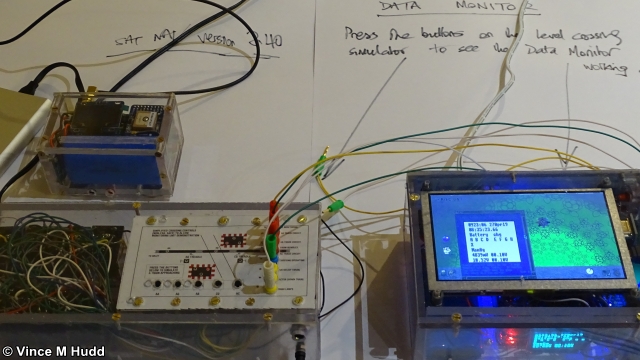
RISCOSbits
Andy Marks had brought along a wide range of snazzy looking cases and other products with snappy and amusing names for the RISCOSbits stand.
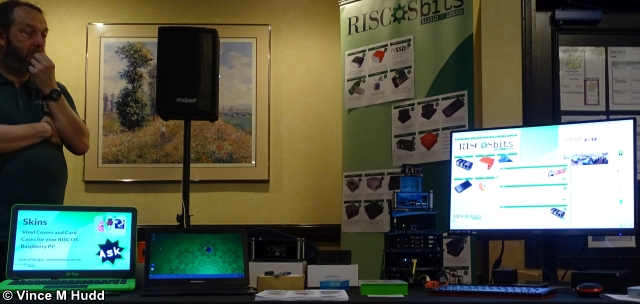
There were new versions of wireless networking solution Wispy – with variants that work alongside R-Comp’s PiFi3 offering; the Wispy H and Wispy Z. Another variant is the Wispy V, which consists of a Chinese ethernet-wireless bridge that RISCOSbits supplies with specifically-written instructions on setting up using Otter or Qupzilla on RISC OS. The original Wispy software was also available, albeit now supplied with Chromium rather than Firefox as the default browser.
The range of cases available included the usual suspects – the PiSSDup, Deuce, UniqAce, etc. – and there were also systems available such as the Qadro range, small-footprint RISC OS computers based around the Wandboard Quad (the same board found in R-Comp’s ARMX6), and the PiRO, based around the Raspberry Pi.
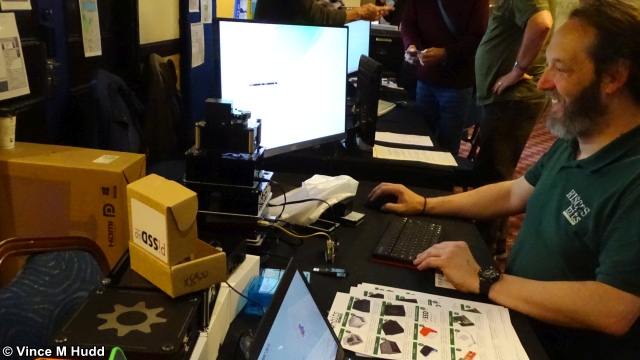
It goes without saying that you probably have an interest in computers, and RISC OS in particular – that’s why you’re reading this – but if you also like action movies, and you’re a fan of puns, you’ll have had the opportunity to buy a PiHard with a Vengeance; a Raspberry Pi-based system that uses a special adaptor board that controls an SSD and brings all the ports to one side.
While chatting, and noting a particular stack of items on Andy’s table, I suggested a good name for a suitably designed case (or system) would be a PiROmid. I wasn’t serious. I really wasn’t… However, if you want to see a PiROmid, you need to pop along to the London Show on 26th October!
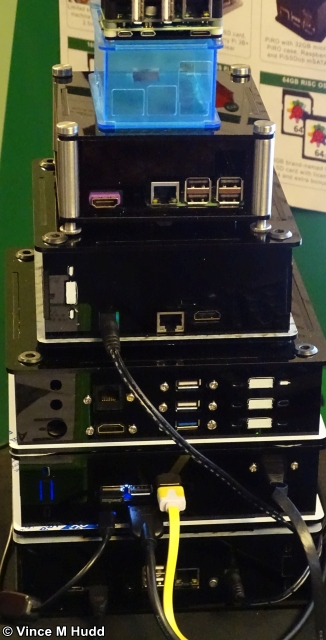
North One Communications (Organizer)
The – no THE – personal information manager for RISC OS could be found on the North One Communications stand, where Cut-me-own-throat Dibbler Nigel Wilmott was selling the latest version of Organizer in its on-a-stick form. That latest version is version 2.28a, which was released for the 2018 Wakefield Show and included a number of bug fixes and improvements over version 2.28, such as a better interface with Sine Nomine’s RiscOSM.
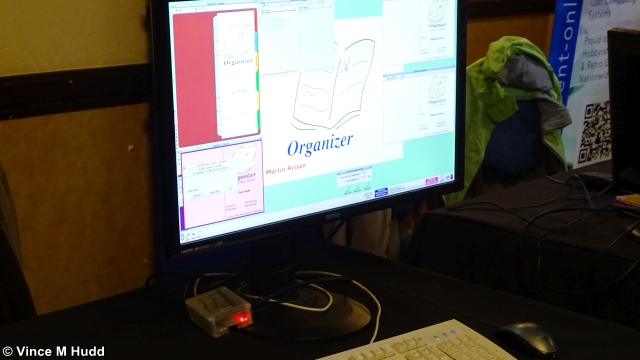
The -on-a-stick version of the software is supplied on a USB flash drive, pre-installed in a copy of the latest version (9.1) of RPCEmu, running RISC OS 5.24, which means it is ready to run on a Windows PC.
Sine Nomine
With a number of updates to their various applications, Matthew and Hilary Phillips were next, on the Sine Nomine stand.
That – unsurprisingly – included RiscOSM, the mapping application that uses data derived from Open Street Map. Impressive when it was first launched, the software has since come on in leaps and bounds, and in the short period running up to the Wakefield Show, more improvements had been made. The source data can include routes that users have added, such as long-distance walking trails and cycle paths, and RiscOSM is now able to recognise and display these, for example, and the style editor had also seen improvements, with better support for higher resolution screen modes.
A closely related application is Recce, released for the Southwest Show in February, which can be used in conjunction with RiscOSM to access photographs online, from websites such as Flickr, that relate to the current map position. Another source of those images is Google Street View – and while the initial release allowed the user to change direction and view the 360 degree image from a different angle, the newest version brought with it the ability to – in effect – move along the street.
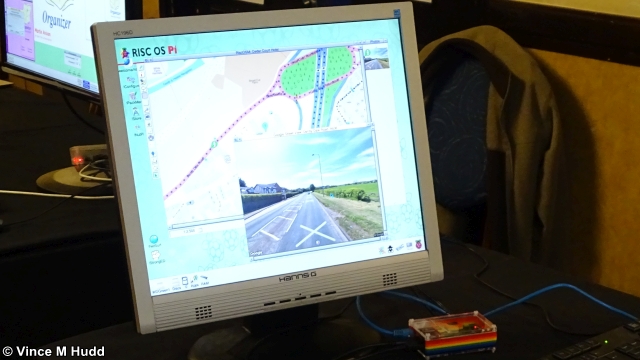
Another related application is OSMConvert, which processes the source data from Open Street Map for use in RiscOSM, and a short while before the show a new version was released. Version 1.18 of the tool, which is freely available from the Sine Nomine website, keeps the data conversion in line with the newer features supported in RiscOSM itself, allows batch conversion and merging (necessary for large datasets) to more easily resume after an error, and so on.
Matthew Phillips gave one of the days’ theatre presentations, in which he demonstrated a number of the new features. Unfortunately, though, while Ruth Gunstone recorded his talk, there was a problem recording the output of his computer – so he is mostly referring to what the audience on the day could see, but which can’t be seen in the video.
Ident Computer / Wi-Fi Sheep
While most of us in the RISC OS world continue to spend our online-time reading usenet and mailing lists, and possibly forums in the case of some of the more progressive members of the community, the rest of the world has moved on, and these days it’s all about social media, podcasts, YouTube, and live streaming.
And that’s where Wi-Fi Sheep comes in. Wi-Fi Sheep is a YouTube channel and Twitch live-streaming service that looks at technology, focusing in particular on computing, and it’s run by Ident Computer. Some of the projects and hardware projects seen on the channel were being shown on the stand, along with some of Ident’s own products, which were once again available to buy directly from the company, such as the 3D-printed RiscCE cases for the Raspberry Pi.
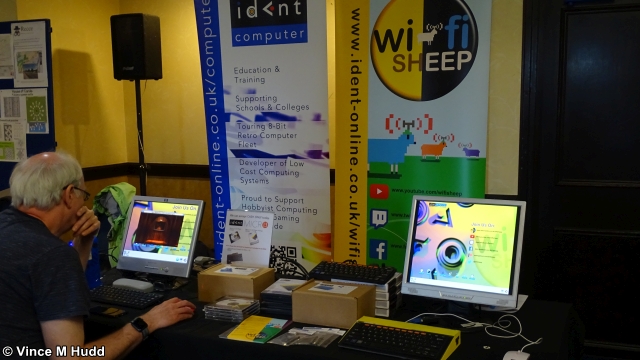
Ident entered first appeared in the RISC OS world only a few short years ago with the Micro One case for the Raspberry Pi, and that case is back… sort of! It’s now available in design form (you supply your own materials), as the Micro 1.5, and this is available by subscribing to them on Patreon. (At the time of the show, this was via their $12 tier, but it’s now on their $6.00 tier)
Tom also gave one of the day’s theatre presentations, in which he talked about much of the above in more detail, and also future plans to attract new users to the platform, and for a series of videos to showcase the operating system.
AMCOG Games
With concept art work shown at the first main show of the year, Tony Bartram was selling the first new AMCOG Games title of 2019 at the second show. That game, entitled Escape from the Arcade, sees the player transformed into binary data after trying to play an arcade game that has a dimensional fault. Trapped in the machine, the only way out is to solve the puzzles.
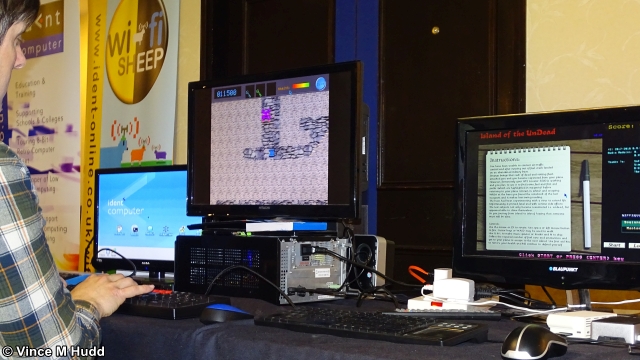
With the new title, the number of games AMCOG has available continues to grow, all of which are available to buy from !Store in the comfort of your own home, or on USB flash drive or CD at shows, and when bought at shows the titles come with a special code to enable free download of updates via !Store.
CJE Micro’s/4D
Having been unable to attend the second Southwest Show in a row, CJE Micro’s and 4D were able to exhibit at Wakefield.
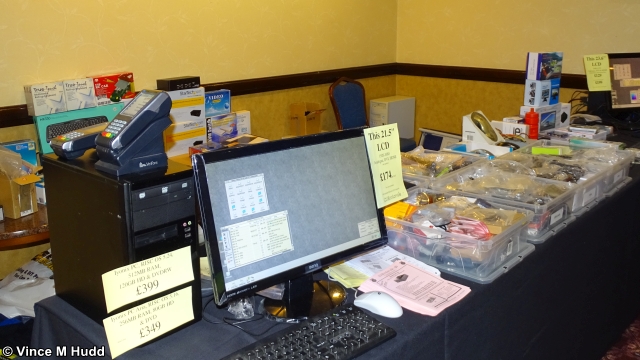
Chris Evans and Andrew Conroy had some new products with them, including a dual monitor KVM – that’s a device for sharing your keyboard, video, and mouse (hence KVM) between more than one computer, but with support for computers that have dual-head support, so the video feed can go to two monitors. Another new product was an IDE Interface Mini Podule – a mini version of the ZIDEFS full-size podule released the previous year. Suitable for the Archimedes A3000, A3010, A3020, or A4000 machines, the device allows various types of drive to be attached, and provide support for up to four partitions.
Another new product was a remote presentation mouse and laser pointer, complete with RISC OS software, with buttons for next and previous screens, a blank screen, and returning to the desktop – ideal, then, for use when giving presentations at RISC OS shows…
Shortly before Chris was due to give his talk, for which he said he had prepared slides in order to demonstrate the pointer rather than adopt his normal method of holding things up, he was unable to find the pointer and feared they’d left them all back at the shop…
Despite that slight mishap, though, he did use the slides (a selection of product photographs in his talk, moving from one to the next via the mouse) – although he also reverted to form by holding aloft some items for the audience to squint at.
Steve Fryatt
With a quite extensive range of software, Steve had his usual spot at one end of the RISC OS Room. The software is available to download from his website, but if you handed him a fiver on the day, he’d give you a CD containing it.
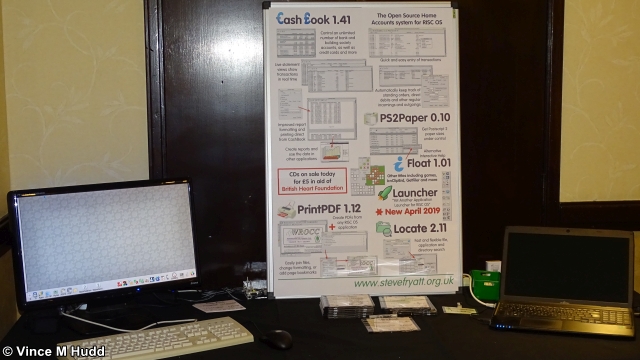
So what’s the incentive for doing that? Sales of the CDs support a good cause – the British Heart Foundation – although another option was to just hand Steve some money and not take a CD in return.
Software on that CD (and the website) includes grumpy home accounts package CashBook and tools for generating PDF documents, amongst many other things. One of those many other things was newly released in time for this show; an old application that has been in use on his own computers for many years – an application launcher, called Launcher, which offers a number of shortcuts from which other applications can be run, and a tidy method of becoming unobtrusive until needed.
RISC OS Open Ltd
Occupying ROOL corner as usual, and thus giving it its official name (well, its unofficial official name, anyway!) were Ben Avison and Rob Sprowson on the RISC OS Open Ltd stand. The usual array of goodies were available to purchase, including the latest development tools, boot-able cards for the Pi (both basic RISC OS cards and the ePic package, which includes a wealth of RISC OS software along with the OS itself), and also boot-able cards for the BeagleBoard and Pandaboard.
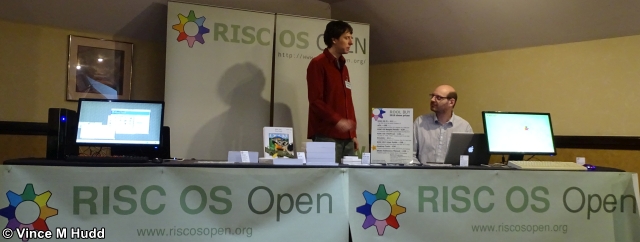
With a number of bounties on the go, whereby money can be donated with a view to funding a particular RISC OS goal (such as overhauling the network stack, which is being looked at in stages), it was possible to make a contribution at the show, and those same bounties were also covered in some depth in the theatre talk given by Rob, in which he also discussed things like the change from Castle’s shared-source licence to the Apache open source one, and the migration to Git for version control – both of which are more appealing to the wider world.
Soft Rock Software
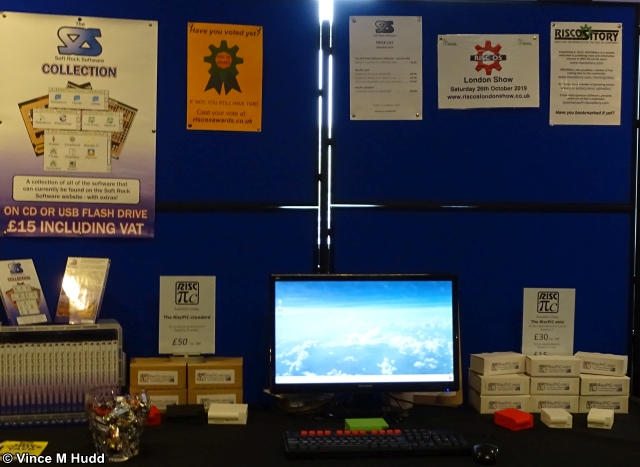
I was next, and had brought along the Soft Rock Software collection on USB flash drive and CD, available again for the bargain price of just £5.00 in order to clear stock of the first edition. I also had hardware available in the form of the remaining stock of RiscPiC cases – designed for the Raspberry Pi, but styled along the lines of the iconic RiscPC case.
For the first time at Wakefield, having finally got the design right before the 2018 London Show, there were two editions of the cases; the original RiscPiC-mini, and the slightly larger RiscPiC-standard.
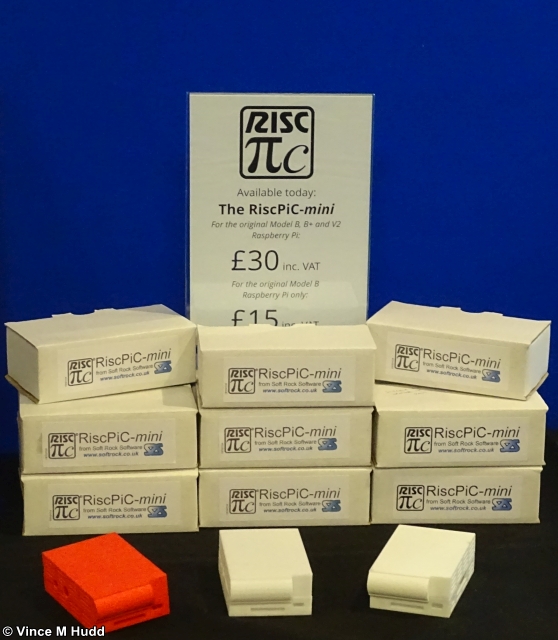
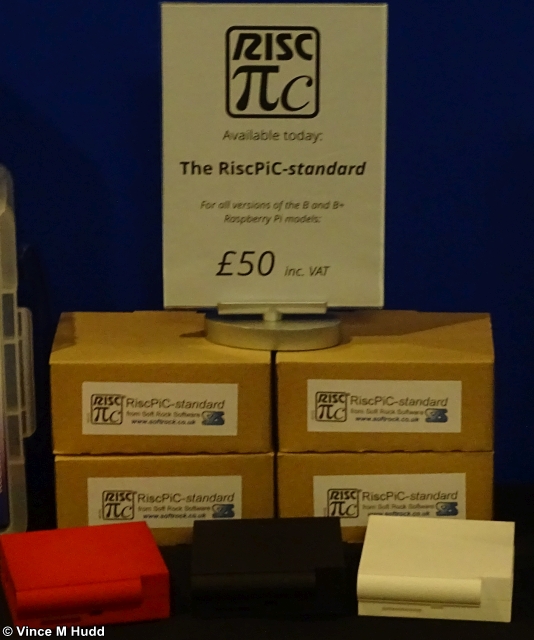
Orpheus Internet Services
Richard Brown was manning the Orpheus Internet Services stand, where people could discuss the services on offer from the most RISC OS-friendly ISP there is. Founded in 2005 by the late Paul Vigay and now run by Richard, Orpheus can provide both ADSL and fibre broadband services, a range of hosting packages depending on individual requirements, as well as the necessary hardware for connecting to the internet.
RISC OS Developments
A recent formation, RISC OS Developments Ltd was set up by Richard Brown and Andrew Rawnsley – and this year the company had its own table, conveniently placed between Orpheus and R-Comp so that both could step in and field questions as necessary.
As well as talking about how the company came to buy out Castle, and thus become owners of RISC OS, and the benefits and opportunities to be gained by the switch to the Apache licence, making the operating system truly open source, the duo were also able to comment on the browser projects, the company’s founding aim.
And for those of us who like our coffee (mm, coffee…), the company also had some snazzy mugs available to buy.
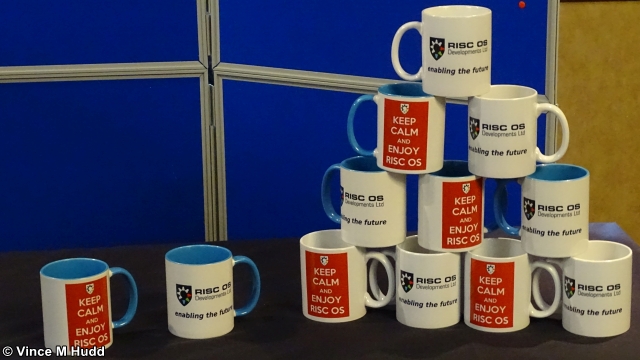
R-Comp
With a large stand featuring a range of hardware and software products, the final exhibitor was R-Comp.
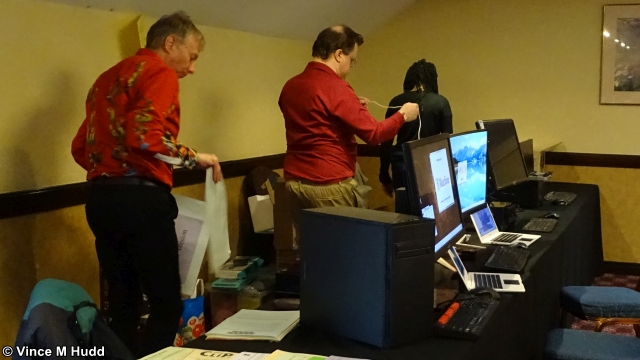
Amongst the company’s hardware was the new laptop, a native ARM device from Pinebook, given the name ARMBook – or thanks to a typo on the part of R-Comp’s Andrew Rawnsley a while back, ARMBok. Andrew said the first sale(s) had been made, and that they were awaiting a shipment of devices, which was expected the following month. At the time of the show, RISC OS on the laptop was now able to access both USB ports, control the back-light, offer battery management, etc.
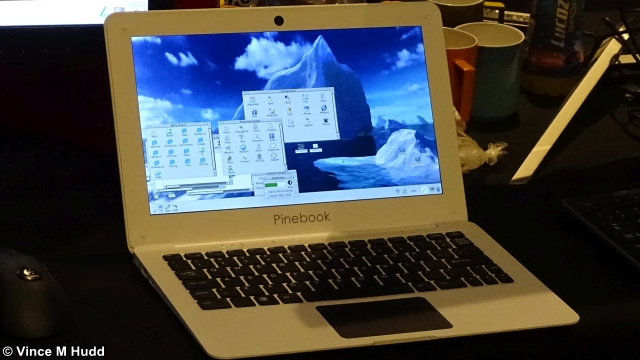
Another laptop, the annoyingly punctuated RISCBook Go! was also available – this being a small and light Windows computer offering an emulated solution for RISC OS.
The company’s newest desktop, Titan – which Andrew describes as a lower cost TiMachine – was also present, and their mini-ARMX6, the mini.m was also theoretically back in stock – although pre-show demand meant that by the time of the show, that had changed. A popular product, R-Comp have apparently bought every one they could find in the UK in order to keep up with demand, and had now established a supply chain.
Amongst the software was NetFetch 5.50, featuring support for the latest SSL/TLS security layers via AcornSSL, as well as new ‘quick-fetch’ menus to allow you to refresh the contents of an individual mailbox – including those otherwise marked as inactive. Messenger Pro 8.02, meanwhile, saw a small bug fixed that prevented the program work properly in ‘Big mode’, a feature of the ARMBook laptop.
Integrated word processor, spreadsheet, and database application, Fireworkz Pro 2.22 benefits from a relatively new ‘Statement Mode’, with alternating lines shaded to make them easier to distinguish, and the software also has better database integration. Version 2.50 of an application for recording your genealogy records called, er, Genealogy Records had gained support for the results of DNA testing and matching, with the data able to be cross-referenced with other information held by the software.
A new version of the ARMSX ARMX6/mini.m graphics acceleration software was also released in time for the show, benefiting primarily from a bug fix to resolve issues when dropping to low-resolution modes outside of the desktop, amongst other things.
As usual, Andrew delivered one of the day’s theatre presentations, covering both RISC OS Developments Ltd with a key aspect of the talk being a semi-demo of the web browsers that are currently works in progress (only local files and screen grabs because he had no internet connection), and R-Comp, talking about the laptop and various pieces of software.
Alan Wrigley, who develops a number of pieces of software on R-Comp’s behalf, and who is often present on their stand at shows, was also selling something of his own from their stand this time around – a DVD of A Humble Station, a documentary film he produced about Branwell Brontë (yes, one of THE Brontë siblings – a brother, though, not a sister) and his time in the Calder Valley, where he worked on the Sowerby Bridge and Luddenden Foot railways.
So that was Wakefield 2019. Normally, this show is followed by the Long Gap – an awfully long period with no main RISC OS shows in the UK until the London Show in October. However, the period between this report appearing and the London Show taking place is a little shorter – the show is tomorrow; Saturday, 26th October at the St Giles Hotel, Feltham. Around four months later, the first of the 2020 shows takes place – the Southwest Show, on Saturday, 22nd February, at the Arnos Manor Hotel in Bristol – and that will be followed a couple of months later by the next Wakefield Show, again at the Cedar Court Hotel, on 18th April. See you there! (And there! And there!)
In the meantime, here are a few more photographs from Wakefield 2019:
